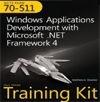
The candidate works in a development environment that uses Microsoft Visual Studio .NET 2010 and Microsoft .NET Framework 4.0 to create WinForms and WPF applications. The candidate should have at least one year of experience developing Windows-based applications by using Visual Studio, including at least six months of experience with Visual Studio 2010 Professional. In addition, the candidate should be able to demonstrate the following: •a solid understanding of the .NET Framework 4.0 solution stack for WPF and WinForm applications •experience in creating data-driven user interfaces for WPF and WinForm applications •experience in creating layouts by using Extensible Application Markup Language (XAML) •experience in programming against the WPF and WinForm object model •experience with unit testing using MSTest •experience with setup and deployment projects
| Developing Windows Applications with Microsoft Visual Studio 2010 | 42 |
| Exam # | Duration | Language | Level | Type | Classroom | Code | Fees |
| 70-511 | 48 | English | Professional | Course | Classroom | Cs327 | 0 LE |
This package is designed to test the candidate's knowledge and skills for developing applications using Windows Forms, WPF and the .NET Framework
• An understanding of the problem-solving techniques that apply to software development, including the following principles of software development: modern software development models - typical phases of a software development lifecycle - concepts of event-driven programming -concepts of object-oriented programming - creating use-case diagrams - designing and building a user interface - developing a structured application • A general understanding of the purpose, function, and features of following .NET Framework topics: Common Language Runtime - .NET Framework class library - Common Type System - Component interoperation - Cross-Language Interoperability - Assemblies in the Common Language Runtime - Application Domains - Runtime hosts supported by the .NET Framework • Experience using Visual Studio 2008 in the following task areas: Declaring and initializing typed variables using the Camel case naming convention - Using arithmetic, relational, and logical operators in code statements - Using branching statements to control code execution - Using looping statements to iterate through collections or repeat steps until a specified condition is met - Creating classes and methods to establish the basic structure of an application - Using methods and events to implement the programming logic of an application - Identifying syntax and logic errors - Accessing and managing data from a data source • Experience in object oriented design and development as follows: Creating and accessing classes and class properties -Creating and accessing methods and overloaded methods - Implementing inheritance, base classes, and abstract classes - Declaring, raising, and handling events - Responding to and throwing exceptions - Implementing interfaces and polymorphism - Implementing shared and static members - Implementing generics - Creating components and class libraries • Experience in N-Tier application design and development as follows: - Managing a software development process - Controlling input at the user interface level in Windows Client applications - Debugging, tracing, and profiling .NET applications - Monitoring and logging .NET applications - Implementing basic testing best practices - Performing basic Data Access tasks with LINQ - Implementing basic security best practices in .NET Applications - Implementing basic service calls - Using .NET Configuration Files Deploying .Net Framework Applications using ClickOnce and the MS Installer
Microsoft Official Courseware (MOC)
This Package includes several labs to ensure you will gain the targeted skills and experience
When you pass Exam 70-511: TS: Windows Applications Development with Microsoft .NET Framework 4, you complete the requirements for the following certification(s): •MCTS: .NET Framework 4, Windows Applications Exam 70-511: TS: Windows Applications Development with Microsoft .NET Framework 4: counts as credit toward the following certification(s): •MCPD: Windows Developer 4